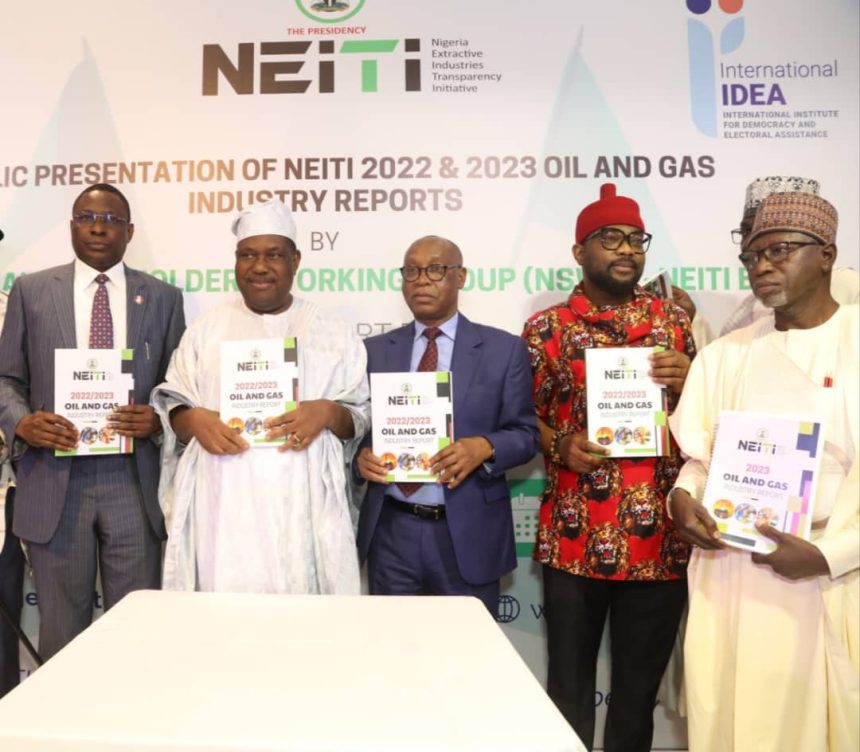By Chidi Ugwu
The Nigeria Extractive Industries Transparency Initiative (NEITI) has disclosed that outstanding collectible revenues due to the Federal Government in the oil and gas industry as of June this year have risen to over $6.071 billion and N66.4 billion, respectively.
Chris Ochonu, Assistant Director, Communications and Stakeholders Management, in a statement, noted that these figures were among crucial information and data contained in NEITI’s 2022 and 2023 Independent Oil and Gas Industry Report, released today in Abuja.
According to the report, a breakdown shows that the outstanding liabilities were $6.049 billion and N65.9 billion in unpaid royalties and gas flare penalties, due to the Nigerian Upstream Petroleum Regulatory Commission as collectible revenues by August 31, 2024.
The report also provides a detailed analysis of the information and data regarding who owes what in outstanding revenues due to the government.
“A further breakdown shows outstanding petroleum profit taxes, company income taxes, withholding taxes, and VAT due to the Federal Inland Revenue Service, amounting to $21.926 million and N492.8 million as of June 2024.On fuel importation, the latest NEITI report disclosed that a total of 23.54 billion litres of PMS (premium motor spirit) were imported into the country in 2022, while 20.28 billion litres were imported in 2023.
“This represents a reduction of 3.25 billion litres, or a 14% decline, following the removal of the subsidy. A detailed 10-year trend analysis (2014–2023) in the NEITI report shows that the highest annual PMS importation into the country, 23.54 billion litres, was recorded in 2022, while the lowest, 16.88 billion litres, was recorded in 2017. The NEITI report also disclosed that a total of N15.87 trillion was claimed as under-recovery/price differentials between 2006 and 2023, with the highest amount, N4.714 trillion, recorded in 2022.On crude production, fiscalized crude production in 2022 stood at 490.945 million barrels, compared to 556.130 million barrels produced in 2021, representing an 11% decline.
“However, in 2023, NEITI’s independent report revealed total fiscalised production of 537.571 million barrels, a 46.626 million-barrel or 9.5% increase from total production recorded in 2022. A 10-year trend (2014–2023) of fiscalised crude oil production in Nigeria shows the highest production volume of 798.542 million barrels was recorded in 2014, while the lowest, 490.945 million barrels, was recorded in 2022.
“The NEITI report also provided detailed information and data on crude lifting. In 2022, total crude lifting was 482.074 million barrels compared to 551.006 million barrels lifted in 2021. In 2023, total crude lifting stood at 534.159 million barrels, representing an 11% increase of 58.08 million barrels.On oil theft and crude losses, a total of 7.68 million barrels of crude were either stolen or lost in 2023, representing a significant drop of 79% (29.02 million barrels) compared to 36.69 million barrels either stolen or lost in 2022.On overall revenue generation in the oil and gas industry, the report showed that material companies accounted for US$15.549 billion (96%) and non-material companies for US$695.604 million (4%) in revenues generated in 2022. In 2023, material companies accounted for US$21.415 billion (95%), and non-material companies accounted for US$1.238 billion (5%).
“The revenues came from 17 identified revenue streams, including proceeds from taxes, oil and gas sales, dividends from NLNG, royalty payments, signature bonuses, gas flare penalties, and concessions.NEITI’s independent industry report carefully reviewed and reported on all aspects of the regulatory framework for the oil and gas industry, including the legal framework, fiscal regime, roles of government entities and reforms, laws (PIA 2021), and regulations relating to addressing corruption risks in the oil and gas sector.
“The report also conducted an overview of the statutory procedures for the awards and transfers of licenses. It disclosed comprehensive information on property rights to oil and gas licenses and leases, including beneficial ownership information and public accessibility of contracts and licenses.Other areas covered included disclosures on the participation of state-owned enterprises in the oil and gas sector, exploration, production levels, and the valuation of extractive output. A total of seventy-eight (78) companies in the oil and gas industry and nine (9) relevant government agencies that collect, keep custody, or manage oil and gas revenues were covered by the NEITI process” it noted.
Speaking at the public presentation of the report today in Abuja, the Secretary to the Government of the Federation, Sen. George Akume, reaffirmed “the unwavering commitment of the Federal Government of Nigeria to the principles of the Extractive Industries Transparency Initiative (EITI) being implemented in the country’s oil and gas sector by NEITI. We consider the EITI not only as a global standard for promoting transparency in the management of revenues from natural resources but also as a tool to strengthen public trust, accountability, and economic growth,” the SGF stated.Sen. Akume, who also chairs the NEITI board, acknowledged that information and data provided by NEITI’s independent reports have consistently proven invaluable to the government. These reports have guided policy decisions, reforms, and measures that foster accountability, particularly in the oil and gas sector. In a sector where opacity could easily lead to leakages, inefficiencies, and corruption, NEITI has become an indispensable partner in ensuring that Nigerians are fully aware of how their commonwealth is managed.He gave assurances that the government’s commitment to this process extends beyond simple endorsement. The Federal Government considers NEITI’s role as a beacon of transparency and accountability in the extractive industries, and the credibility of its reports serves as a foundation for formulating national policies, fighting corruption, revenue growth, and ensuring equitable distribution of revenues. The data contained in this report will inform critical government decisions moving forward, especially as we continue to prioritize resource management, revenue mobilization, and public accountability.
The SGF further emphasized, “As the Chairman of the NEITI Board, I stand before you today to underscore the Federal Government’s respect for NEITI’s independence. While my role as Chairperson is a testament to the importance the government places on NEITI, it also signifies the commitment to ensure that NEITI operates independently, without interference, as mandated by the EITI standard. It is our duty to safeguard this independence with great care and diligence, ensuring that NEITI can operate free from undue influence,” Sen. Akume concluded.
The Executive Secretary of NEITI, Dr. Orji Ogbonnaya Orji, explained that the preparation of the report followed a meticulous and transparent process in line with global Extractive Industries Transparency Initiative (EITI) standards. “A rigorous, multi-stakeholder approach was adopted, involving extensive collaboration with government agencies, extractive companies, civil society, and indigenous consultants. We ensured that all data was collected, validated, and reconciled in an open and transparent manner,” the NEITI Executive Secretary stated.
Dr. Orji added that the report provides valuable insights that will help guide policy, encourage robust public debate, and ultimately improve governance in the management of our natural resources. The report, as always, remains a vital tool for identifying leakages, improving revenue collection, and promoting resource management reforms.
The Chairman of the EFCC, Mr Olanipekun Olukoyede used the occasion that any agency or extractive playing with full compliance and cooperation with NEITI Independent Audit process is making a huge mistake as the EFCC and NEITI in close partnership in the challenging war against especially in the oil, gas and mining industry.
The EFCC chairman publicly stated that where the work of NEITI stops, is where the work of EFCC begins. The Chairman announced that from NEITI’s past reports, EFCC recently recovered and remitted to the Federal Government coffers over N1 billion.
He gave an assurance that the current reports released by NEITI will be taken over by the EFCC for thorough and further investigations of its findings and recommendations. The Chairman commended the Executive Secretary of NEITI, Dr Orji Ogbonnaya Orji and his team for the knowledge, skills and competence and the NEITI National Stakeholders Working Group for the strong leadership behind the agency.
The NEITI 2022/23 Independent Report of the Oil and Gas Industry underscored the urgency for the President to reconstitute a Presidential Committee to design a strategic implementation plan to guide the implementation of the Petroleum Industry Act, among other incisive overall governance and sector-specific recommendations.
The presentation was attended by Chairmen of National Assembly Committees, captains of industries, members of diplomatic missions, development partners, civil society organisations and the media.











